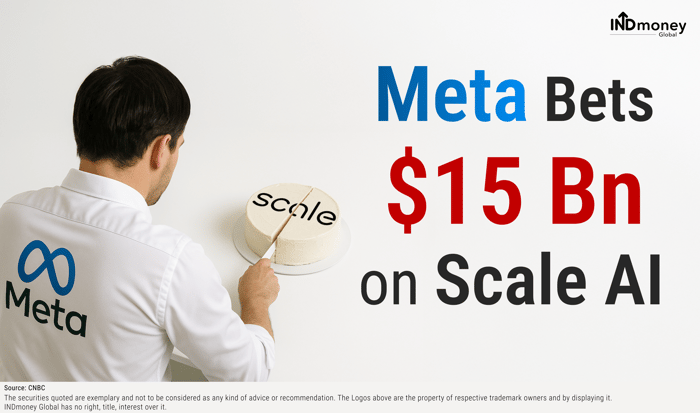Analyzing the OpenAI Future Partnership with Scale AI After Meta Deal: What Meta’s $15B Investment Means for the AI Industry
Estimated reading time: 8 minutes
Key Takeaways
-
- Meta has made a significant $15 billion investment in Scale AI, securing a 49% non-voting stake.
-
- This deal aims to give Meta privileged access to Scale AI’s crucial data labeling expertise.
-
- The deal introduces uncertainty for the OpenAI future partnership with Scale AI after Meta deal, despite Scale AI’s commitment to all customers.
-
- The Meta Scale AI investment impact on AI industry includes potential competitive tensions for players like Google and smaller AI labs.
- The investment highlights the increasing importance of high-quality labeled data as a critical resource in the AI race.

Table of contents
Introduction
The artificial intelligence landscape is constantly evolving, marked by rapid technological advancements and strategic corporate maneuvers. Recently, a piece of news sent significant ripples through the industry: Meta’s substantial investment in Scale AI.
Reports indicate that Meta is making a staggering investment, believed to be around $15 billion for a 49% stake in Scale AI. This move is not just a financial transaction; it’s a powerful strategic play in the high-stakes game of AI development.

This begs a crucial question: What does the Meta Scale AI investment impact on AI industry mean for the broader competitive landscape? What will be the fallout for major players like OpenAI and Google? Our focus today is to analyze these implications, particularly examining the OpenAI future partnership with Scale AI after Meta deal.
Scale AI stands as the undisputed leader in providing the critical data labeling services crucial for training advanced AI models. Their work underpins the capabilities of many of the most sophisticated AI systems we see today. Meta’s significant investment in such a pivotal company suggests a fundamental shift is underway.
In this blog post, we will delve deep into this development. We’ll first understand the fundamental importance of Scale AI’s services. Then, we’ll unpack the details of Meta’s strategic $15 billion move and explore Meta’s objectives behind this massive bet. The core of our analysis will examine the potential effects on OpenAI and Google, two other major Scale AI customers. Finally, we will discuss the broader implications for the entire AI data and training ecosystem. This deal isn’t just about Meta and Scale AI; it has the potential to redraw the lines of competition in the AI race.
Understanding Scale AI’s Critical Role in the AI Ecosystem
Before we can fully appreciate the magnitude of Meta’s investment, it’s essential to understand *why* Scale AI is so important in the first place.
At its core, Scale AI specializes in providing meticulously labeled datasets. Think of it as the unsung hero behind the curtain of modern AI. While AI models like large language models (LLMs) are incredibly complex, they are fundamentally trained on vast amounts of data. And the quality and relevance of that data are paramount.
Scale AI employs a sophisticated human-in-the-loop approach, combining human annotation expertise with advanced software to create structured, high-quality datasets for training AI. This process is far from trivial. It involves complex tasks like:
-
- Identifying and bounding objects in images and videos
-
- Transcribing and annotating audio
-
- Labeling and categorizing text data for natural language processing
- Creating synthetic data for training in specific scenarios

The accuracy and reliability of modern AI systems, from self-driving cars to conversational AI assistants, *hinge* on the quality of their training data. Poorly labeled data leads to biased, inaccurate, or unreliable AI models. Scale AI’s services ensure that AI developers have access to the vast, well-labeled datasets required to build and refine cutting-edge AI.
For years, Scale AI has established itself as a critical supplier and a highly valued partner for virtually all major players in the AI space. This includes not just Meta, but also OpenAI, Google, Microsoft, Amazon, and many others. They provide the essential fuel – the structured data – that powers the AI engines these companies are building.
Their position as a *central* provider of Scale AI data labeling services for large language models and other advanced AI systems makes them an indispensable component of the global AI ecosystem. Any major strategic move involving Scale AI, therefore, has the potential to ripple throughout the entire industry.
Decoding Meta’s Strategic $15 Billion Bet on Scale AI
Meta’s decision to invest such a substantial sum – a reported $15 billion – in Scale AI is a bold and highly strategic move. While the exact terms are complex, the core of the deal appears to be Meta acquiring a 49% minority, non-voting stake. This isn’t a typical venture capital investment; it’s an unusually large and influential transaction, signaling Meta’s deep commitment to accelerating its AI capabilities.

So, what are Meta’s primary objectives behind this massive bet?
-
- Securing Privileged Access to Data Expertise: The most immediate and clear objective is to ensure Meta has prioritized, perhaps even exclusive access to Scale AI’s top-tier data labeling services and expertise. As Meta pursues ambitious AI projects, including its stated goal of achieving “superintelligence,” access to high-quality, custom-labeled data becomes incredibly critical. This investment likely guarantees Meta’s needs are met with speed and precision.
-
- Strengthening Internal AI Development: Beyond just data access, the deal brings Scale AI’s founder, Alexandr Wang, into Meta’s AI leadership in some capacity. This infusion of top-tier talent and strategic insight from a leader in the AI data space can significantly accelerate Meta’s own AI development and refine its strategy.
- Gaining Leverage in the Data Ecosystem: By becoming the largest shareholder in Scale AI, Meta gains significant influence within the ecosystem that provides the fundamental building blocks for AI. This strategic position could potentially allow Meta to tighten its grip on a key resource, making it harder or more expensive for competitors to access the same quality or volume of data services.

It’s important to clarify the nature of the deal. This is an investment resulting in a significant minority stake, *not* an outright acquisition where Meta takes full control. Scale AI is expected to continue operating independently under its interim CEO, Jason Droege. However, the line between “independent operation” and “deep strategic alignment” becomes blurry when one customer holds a 49% stake.
This Meta Scale AI investment impact on AI industry is profound because it injects a major AI developer, Meta, directly into the heart of the data supply chain relied upon by its rivals. This has immediate implications for existing Scale AI customers.

Analyzing the OpenAI Future Partnership with Scale AI After Meta’s Deal
OpenAI is one of the most prominent players in the generative AI space, known for models like GPT. It is also a major customer of Scale AI. Historically, OpenAI has heavily relied on Scale AI’s data labeling services to refine and improve its cutting-edge models. Their relationship has been a key part of OpenAI’s success in developing models that are highly accurate and aligned with human instructions.
However, the news of Meta’s massive investment immediately introduces a layer of uncertainty for the OpenAI future partnership with Scale AI after Meta deal. While Scale AI has publicly stated its intention to “accelerate innovation and strengthen strategic partnerships with customers,” suggesting a desire to maintain existing collaborations, including with OpenAI, the competitive dynamics have undoubtedly shifted.

Let’s analyze the potential complications that Meta’s involvement introduces:
-
- Shifting Priorities: Although Meta’s stake is minority and non-voting, its commercial relationship with Scale AI has deepened exponentially. This raises the question of whether Scale AI’s resources, talent, or capacity could become more closely aligned with Meta’s strategic priorities over time. Could Meta effectively consume a larger portion of Scale’s available capacity, indirectly impacting others?
-
- Competitive Tension: OpenAI and Meta are direct competitors in many areas of AI development. Having a rival become the largest shareholder in a key supplier creates inherent competitive tension. OpenAI might worry about information leakage, even if unintended, or that their data labeling needs could be deprioritized compared to Meta’s.
- Access to Premium Services: A significant concern could be the risk of Meta gaining privileged access to new or premium data services, tools, or methodologies developed by Scale AI. This could potentially give Meta an edge in training more advanced models compared to competitors who don’t have the same level of access or influence.
However, it’s crucial to consider the mitigating factors. Scale AI’s public commitment to maintaining relationships with all major clients is significant. Furthermore, Meta’s stake *is* minority and non-voting. This structure is specifically designed to allow Scale AI to continue serving a broad array of clients without Meta having the explicit power to block them from working with competitors like OpenAI or Google. Scale AI’s business model relies on serving multiple AI leaders, and alienating them would be detrimental.
In conclusion regarding OpenAI, their partnership with Scale AI is likely to continue in the near term due to the established relationship and Scale AI’s stated intent. However, the landscape has changed. OpenAI will need to carefully navigate this relationship, being mindful of the shifting competitive and ownership dynamics. The long-term evolution of the OpenAI future partnership with Scale AI after Meta deal will depend on how Scale AI manages the balance between its new deep relationship with Meta and its ongoing commitments to other critical customers.
Google’s Position Following the Meta-Scale AI Deal
Google, like OpenAI, is a titan in the AI world and a longtime customer of Scale AI. Google has historically partnered with Scale AI for specific data labeling needs, supplementing its own vast internal data resources and annotation teams. While Google has significant in-house capabilities, external partners like Scale AI provide specialized expertise, surge capacity, and access to diverse annotation pools, making the relationship strategically important for various Google AI projects.
The Meta investment in Scale AI introduces new considerations for the Google relationship with Scale AI after Meta investment. While Google might be slightly more insulated than OpenAI due to its extensive internal infrastructure, it’s not immune to the potential impacts.
Potential concerns for Google following this deal include:
-
- Indirect Insight: Even with a non-voting stake, Meta’s deep relationship with Scale AI could potentially offer it indirect insights into how Google leverages Scale’s services – the types of data being labeled, the scale of projects, or even certain methodologies being employed. While direct competitive data sharing is unlikely and potentially illegal, strategic proximity can still be uncomfortable for a competitor.
-
- Access and Cost: Similar to OpenAI, Google could face concerns about access to Scale AI’s most advanced or in-demand services. Could Meta’s investment mean Meta gets preferential treatment, leading to worsened access or potentially higher costs for Google for premium data services from Scale AI?
- Dependency Risk: While Google has strong internal teams, reliance on external partners for specific or large-scale labeling tasks is still part of their strategy. Any disruption or shift in priority at Scale AI could pose a challenge, potentially forcing Google to rapidly ramp up internal resources or seek alternative suppliers.
However, as with OpenAI, there are mitigating factors for Google. Meta’s stake is explicitly minority and non-voting. This limits its ability to unilaterally prioritize its own projects at Google’s expense or dictate terms in a way that actively harms Google. Scale AI’s business model relies on serving all major AI companies, and alienating a customer as significant as Google would be a self-inflicted wound. Scale AI has publicly committed to maintaining relationships with all existing major clients, which includes Google.
Furthermore, Google’s existing deep in-house data resources and labeling teams provide a crucial buffer. They are not as solely reliant on Scale AI as some smaller players might be. This internal strength makes Google somewhat more insulated from immediate disruption. Nevertheless, external expertise and capacity remain strategically important, meaning the evolution of the Google relationship with Scale AI after Meta investment will be closely watched internally at Google and by industry observers.

The Meta Scale AI investment impact on AI industry presents both challenges and potential non-issues for Google, requiring careful management of the relationship going forward.
Broader Implications: What Meta’s Investment Means for Competitors
While much of the attention focuses on giants like OpenAI and Google, the Meta Scale AI investment impact on AI industry extends far beyond them. This landmark deal has significant implications for a wide range of competitors across the AI data and training ecosystem, particularly for smaller AI labs, startups, and other companies building AI products.
What Meta’s Scale AI acquisition means for competitors (note: It’s an investment, not an acquisition, but the *impact* is similar to increased competitive leverage):
-
- Increased Anxiety over Data Access: Many smaller AI companies rely heavily on Scale AI for their data labeling needs because they lack the internal resources of a Meta or Google. These competitors may now worry about tighter access to Scale’s premium data services, longer wait times, or potentially higher costs as Meta’s strategic interests become more central to Scale AI’s operations. The perception, even if not the immediate reality, is that a primary supplier is now significantly aligned with a major competitor.
-
- Driving Demand for Alternatives: This potential uncertainty or perceived risk could paradoxically benefit alternative data labeling providers. As AI labs and startups seek to diversify their suppliers and reduce their exposure to a supplier now partially owned by a major competitor, we may see increased demand for services from Scale AI’s rivals in the data annotation and labeling space. This deal could inadvertently fuel growth for other players in the data ecosystem.
- Highlighting Data as a Bottleneck: Perhaps the most significant broader implication is how this deal starkly highlights the centrality of labeled data as a “bottleneck resource” in the AI race. Building truly advanced AI requires massive, high-quality, well-structured datasets. The companies that can secure consistent access to these datasets have a significant advantage.

As Scale AI’s evolution progresses and Meta becomes a significant shareholder, the competition for this fundamental resource is only set to intensify across the industry. Expect to see increased investment not only in data labeling services but also in synthetic data generation, data management platforms, and other technologies aimed at securing this vital input for AI development.
This deal serves as a wake-up call for many. Access to compute power and algorithmic innovation are important, but the ability to acquire, process, and utilize vast amounts of high-quality data is becoming perhaps *the* most critical differentiator in the race for AI leadership. Meta’s move underscores this reality with a $15 billion exclamation point.
Conclusion: Reshaping the AI Data Landscape
Meta’s substantial $15 billion investment in Scale AI is not just a financial transaction; it’s a strategic move with the potential to significantly reshape dynamics within the AI industry, particularly concerning the critical supply of high-quality training data.
While Meta gains privileged access and strategic alignment, it’s important to reiterate the nuance: Scale AI has publicly committed to maintaining its independence and supporting all leading AI innovators, including its long-standing customers.

Frequently Asked Questions
What is Meta’s investment in Scale AI?
Meta has reportedly invested around $15 billion in Scale AI, acquiring a 49% minority, non-voting stake in the company.Why is Scale AI important to the AI industry?
Scale AI is crucial because it provides high-quality labeled datasets, which are essential for training advanced AI models, including large language models. Their human-in-the-loop services ensure the accuracy and reliability needed for modern AI.How does the Meta investment affect the OpenAI future partnership with Scale AI?
While Scale AI has committed to continuing partnerships, Meta’s significant investment and strategic alignment introduce competitive tension and potential concerns for OpenAI regarding access priority or potential insights, despite Meta’s stake being non-voting.What does the deal mean for Google’s relationship with Scale AI?
Google is also a major Scale AI customer. The deal presents potential concerns about access and cost for premium services, although Google’s extensive internal data resources provide some insulation. Scale AI has stated it will continue serving all major clients.What is the broader impact of the Meta Scale AI investment on the AI industry?
The deal highlights the critical nature of data as a resource bottleneck, potentially increasing demand for alternative data providers and intensifying competition across the entire data services sector for AI training.






